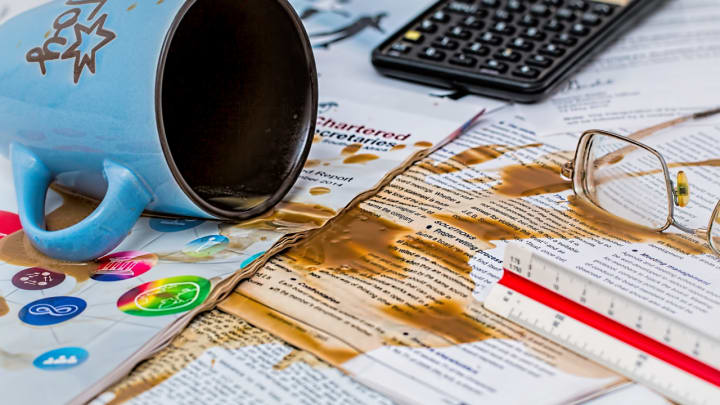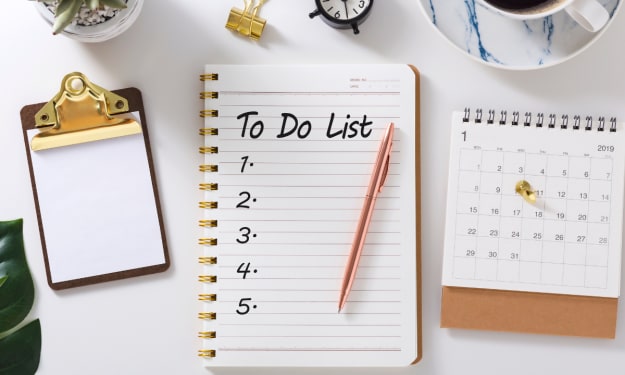The Distinction between Making a Mistake and Making a Choice
There are no mistakes, only lessons!

When he is caught cheating on his wife, a politician admits that he "made a major mistake" and apologizes to her. A lady in business lies to the Internal Revenue Service and omits a significant portion of her revenue while filing her taxes. A son deceives his mother about something important but subsequently admits to his "error." However, the instances provided are not errors; rather, they are examples of poor decisions.
On a test, making a mistake by selecting the incorrect answer is a mistake; making the poor judgment of not studying for the test is a choice. An error was something you did unintentionally, whereas the poor decision was something you made on purpose, most of the time without giving any thought to the repercussions.
It's simple to justify your poor choices by saying they were just mistakes instead of decisions. It lessens the severity of the impact, which in turn makes it easier to bear.
However, this is only the beginning of the problems; if you reframe a poor choice as an error, you absolve yourself of responsibility for the outcome, which means that it is no longer your fault. It is also a lot simpler to accept the consequences of your poor choices if they were not your fault.
Consequently, if you just consider it a mistake, you are more likely to make the same poor decision repeatedly. This is because it is easier to rationalize bad decisions. This kind of behavior is the very definition of insanity.
We all make mistakes. We are all guilty of making poor choices. They are a natural and inevitable element of being human.
Failure is often the path to success, and we can learn from our poor choices, but let's not mix the two. We may celebrate our mistakes (failure is often the key to success), and we can learn from our poor choices; but, let's not confuse the two.
The following are some instances of common errors:
You thought you were adding salt when you actually just added sugar to your vegetables. This is a mistake.
You failed to remember to charge your tablet, and the battery is now completely depleted, so you are unable to read your book on it. This is a mistake.
The following are some examples of choice:
Despite the fact that you are aware that you should, you do not exercise at the gym. You have a choice here.
You grab something to eat at a fast food restaurant despite the fact that you are aware that this is not the healthiest option. You have a choice here.
What is the Main Distinction between Making a Choice and Making a Mistake?
Your awareness and the intention you bring to this process are the two most crucial things involved in it. To begin, given that we are all human, there is always the possibility that one of us will make a mistake. There are plenty of them, and some of them are major gaffes, while the others are only small setbacks.
The old adage that "there are no mistakes, only lessons" is one of my favorites. This is crucial because we can make progress in life when we recognize our inadequacies and learn wisdom from them. This is why this is significant,
Recognizing that you have the ability to change both yourself and the results that you are now getting in your life is another critical step to take.
You have the ability to make amends for your error, even though doing so is not always simple, particularly when faced with a difficult circumstance.
When it comes to responsibility, placing blame on others or coming up with excuses is really just an exercise in living in denial.
When A Man Cheats, Is It An Accident, Mistake, Or A Choice Video:
What is the Difference Between These Two?
The difference between a mistake and a choice is that the latter requires making a conscious decision. The difference that really matters is in your intentions.
It is a choice to act in a way that you are fully mindful of, especially when you are aware that your actions may do harm to other people.
When you drink alcohol and then go behind the wheel of a vehicle, you are making a very poor decision. That is not an error on your part.
You were aware that you had consumed too much alcohol, but you still made the decision to get into the automobile nonetheless.
It is possible that you did something that ended up harming someone else, even though that was not your intention when you did it; in that case, what you did could be deemed to be a mistake.
On the other hand, you are making a decision if you choose not to accept responsibility and clean up the mess that you produced.
There will be Repercussions for Your Actions!
The decisions we make, whether they're good or bad, always have repercussions. There may be repercussions that were not intended, but there will still be consequences.
For example, after a night of drinking, you decide to get in your car and drive. It is possible that the police will pull you over, that you will blow too high on the breathalyzer, and that they will then arrest you.
Not only have you put yourself and other people in danger, but you now face the possibility of spending time in jail, appearing in court, paying a fine, having your license revoked, or all of the above.
If, on the other hand, you sprinkled sugar on your vegetables instead of salt, the result would be that you spoiled the food, there would be a financial cost (albeit it would be minimal), and you would need to prepare your meal all over again.
We All Make Mistakes!
Yes, each and every one of us is capable of making errors and terrible decisions. It's possible for us to make poor decisions in important areas of our lives, such as choosing the wrong person to spend our lives with, being cruel to others when we're upset, or tripping over our own feet.
The silver lining is that we can improve ourselves by gaining wisdom from our errors and poor decisions. If we choose to ignore the instruction, it is our decision.
It is my hope that as we get older, we will learn how to take responsibility for our actions and make wiser decisions. On the other hand, we cannot eliminate the possibility of making errors. We certainly don't want to hear the same ones over and over, do we?
It may be beneficial to make a distinction between actions that are mistakes and those that are choices. It is my sincere hope that we will make a poor decision, come to terms with what we have accomplished, and resolve to never act in such a way again.

About the Creator
Lorna Harvey
My love of writing is relatively new but since I started it has become a passion. I hope you enjoy my writing and look forward to your comments.






Comments
There are no comments for this story
Be the first to respond and start the conversation.